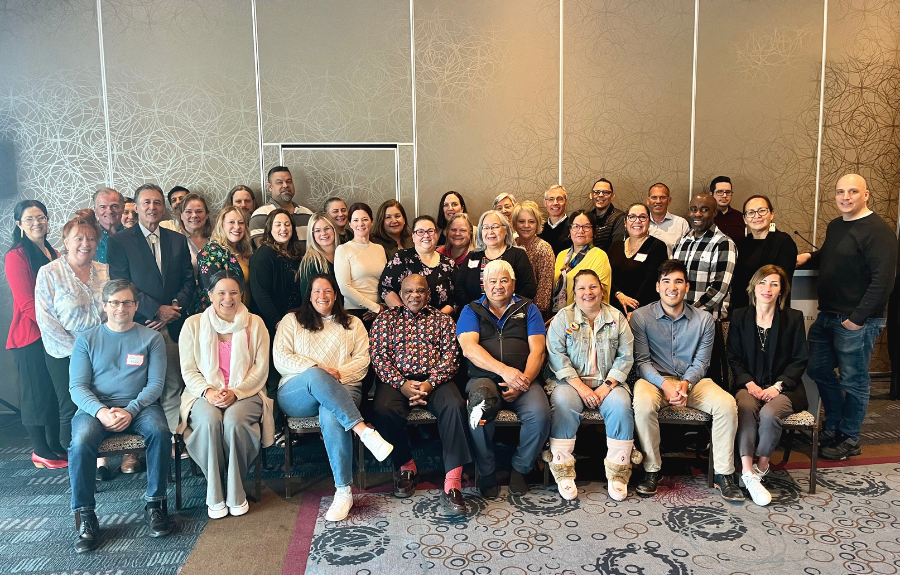In March and April, the First Nations Health Authority (FNHA) hosted two Knowledge Exchange sessions with guests from Sioux Lookout in northern Ontario and Māori representatives from New Zealand. The goal of the sessions was to share lessons learned in delivering health services to First Nations in BC while seeking ways to innovate and improve services from experiences in other jurisdictions.
“It's creating that larger community across Canada and the world where it brings us a lot more strength when we know we have other First Nations communities working towards the same goals," says Michelle DeGroot, FNHA VP for Policy, Planning and Strategic Services. “If we can learn from others without spending the time, effort and resources to do the same thing, I think that benefits all of us."
As the first and only province-wide health authority of its kind in Canada, the FNHA presented on the unique history of the First Nations health governance structure in BC as well as programs and services delivered since the transfer day in 2013. A funding breakdown showed that 92 percent of the FNHA's funding goes directly to community services.
“As First Nations people in this country, I think we have an obligation to connect with each other and share knowledge so that we're not struggling to reinvent something that we don't need to," says Sonia Isaac-Mann, who worked for the FNHA from 2015 – 2023 before leaving to become CEO of the
Sioux Lookout First Nations Health Authority (SLFNHA) which serves 33 Anishinabe communities in Ontario.
Innovations in medical transportation, accommodation and remote services

On April 4 – 5, Isaac-Mann brought 22 of her staff from Sioux Lookout to BC for two days of knowledge exchange with the FNHA. Her team shared innovations around medical transportation and accommodations. SLFNHA owns three hostels where they house and feed patients and their escorts who need to travel for medical services.
“They do a lot of things differently when it comes to their hostels and how they transport people out of their community into Sioux Lookout for their medical appointments. I think that's fabulous and something that would really benefit our region as well," says Julie Morrison, FNHA VP, Northern Region.
The population size and geography of the SLFNHA service area and the FNHA's Northern Region are similar. While the FNHA is moving ahead with 15 primary care centres across BC, SLFNHA follows Alaska's Nuka model – made up of four “Pods" of practitioners that travel to communities together.
“It's going to look a little different," says Isaac-Mann. “The context is different. The politics are different. But priorities are similar."
Toi Ora – the pinnacle of wellbeing
On March 12 – 13, the FNHA was joined by representatives from
nib and
Toi Ora, which together provide health insurance and an ecosystem of health system navigation for Māori people in New Zealand. Toi Ora means “the pinnacle of wellbeing" and aims to help Māori members achieve health equity to the level of non-Māori.
Māori experience poorer outcomes than non-Māori in almost all aspects of health. Māori also struggle to interact with the health system with one in five Māori adults reporting it is difficult to get health assistance that aligns with or incorporates Māori cultural practices.
The Hapū (sub-tribe) Ngāti Whātua Ōrākei and nib have developed the Toi Ora Tick which is an accreditation for health care providers who demonstrate they provide culturally positive healthcare experience for Māori. The FNHA meanwhile has developed a
Cultural Safety and Humility Standard to help health care providers in BC integrate cultural safety into practice with First Nations clients.
“It doesn't matter where you are in Canada, in the world, as Indigenous people you're going to face some of the same challenges when it comes to racism and cultural safety," says Julie Morrison. “I'm really proud of the work the FNHA does and I think the more we promote it the more other First Nations communities may follow suit."
The FNHA also provided support for its Māori partners after news broke that New Zealand's conservative government introduced a new bill to dismantle the Maori Health Authority by the end of June 2024 with its functions to be absorbed by the national health system.

